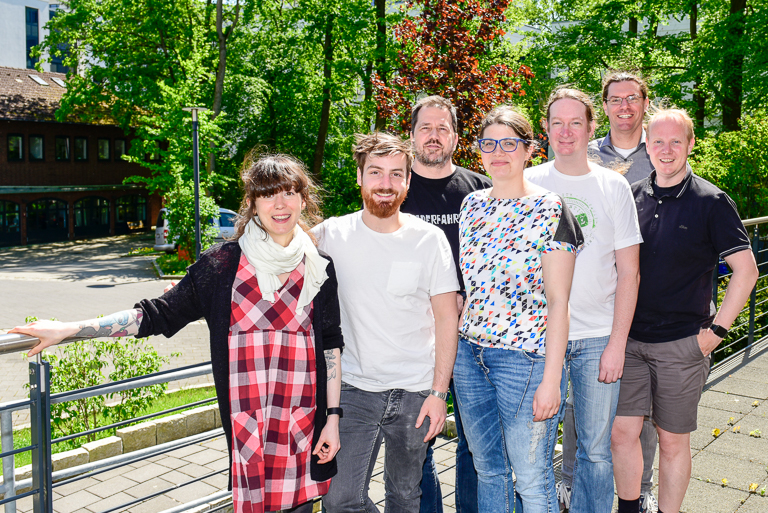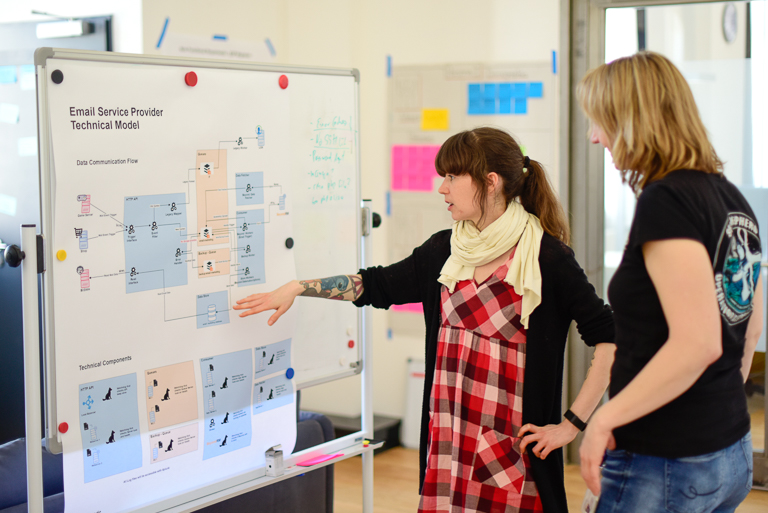
Agile Coaching: How teams deliver a top performance
Companies that develop free-to-play games like we do constantly have to navigate an extremely competitive global market. To be successful in this field, you can’t be afraid to react, learn, and adapt to new situations very quickly. This is exactly what working in agile teams enables us to do. Companies that work with agile methods are always keeping an eye on what a product’s most valuable development path is, meaning that existing plans can always be reworked as needed. Most successful companies work this way, especially in the IT industry, instead of creating a plan at the beginning of the year and then realizing by the end that it should have been changed after the first month. Agile workflows are therefore put in place to make the company faster and better than the competition.
At Goodgame Studios, we are committed to promoting agility throughout the entire company. Since we have achieved tremendous growth in a very short time, and teams and processes constantly change and develop, sticking to this plan isn’t always easy. We have therefore brought in specialized agile coaches to integrate these unique working methods into the teams even more efficiently. Their goal is to create extremely powerful and highly motivated teams that stand out because of their excellent teamwork and that continue to drive forward the company’s success.

The agile coaches of Goodgame Studios
What exactly does “agile” mean?
Our colleague Holger, Agile Tech Lead at Goodgame, currently has a favorite quote that goes: “Agile is not a practice. It is the quality of the organization and its people to be adaptive, responsive, continually learning, and evolving.” For Holger and our other agile coaches, this means making agile methods a permanent fixture in the company structure and mentality, i.e. a special attitude towards work and team organization. This therefore involves a lot more than just introducing a tool set or certain practices, like many people believe.
The essence of agile work methods is a workplace where employees can take on responsibility and feel intrinsically motivated to deliver their top performance. It therefore requires a special type of leadership mindset as well: instead of micro-managing and the “carrot-and-stick” approach, you have to give the employee space to develop and succeed. This way, excellent employees will decide for themselves that they want to take on responsibility and change something in their area.
This is also where the biggest difference between classic project management and agile coaching lies. Instead of a project manager telling the team how they should work, the team decides together what the best solution is for a particular case. Contrary to a hierarchical system that is only as good as the team lead, each and every employee can make an optimal contribution in a self-organized team. When discussions are held on an even playing field, no one should be afraid to share their opinions. This often leads to solutions that are better than when the lead, first, or another role is solely responsible for the task.

Agile support in project management
How does an agile coach work?
The task of an agile coach is to help the teams realize their full potential. According to Holger, this requires a special type of person who can step back yet still maintain a vision of how the teams should work together. In addition to optimizing processes, the coach’s primary role is to improve connections and communication within the team and resolve conflicts. “We always point out the elephant in the room,” says Holger. “If there’s a conflict and no one talks about it, we start the conversation.” Agile coach Dana even takes the process one step further: “It’s not the agile coach’s job to make people happy, but rather to bring up the painful subjects.” Only by digging deeper into the critical issues can a significant improvement be made.
During the workday, the coaches’ specialized tasks are largely dependent on the status of the team they manage. If a new team has recently been put together, they start by establishing some framework conditions and, for example, moderating sprint planning or ensuring that everyone gets a chance to speak up in meetings. When a coach joins an already established team, they first observe the team to understand how it is organized, what can be improved in the teamwork, and where it could use support. The coaches can customize their problem-solving approaches as needed here. Team members often receive individual coaching as well so that they can directly contribute to the team’s success. “We’re almost like a mirror for people. We confront them with their own personality to help them take the next step forward in development,” said Holger.
One example of a method currently used by Goodgame is ‘Planning Poker‘. This allows us to utilize the collective strength of a diverse team and prevent solutions from being adopted without previous discussion. Let’s assume the team receives a unique demand – the next sprint should include a gold mine that players can use to produce extra resources. Instead of the team lead specifying how to do this, the team is first asked to evaluate the task’s complexity. In Planning Poker, every developer gets a stack of cards with the numbers of the Fibonacci sequence (0, 1, 2, 3, 5, 8, 13…). The developer considers how much time they will need for the task and places the card with the corresponding number face down on the table. At the end, the developers’ cards are all turned over at the same time. The team’s various predictions can then all be seen at once. If one lays down a 2 and another a 13, they clearly have some very different ideas of how the feature will be implemented. The developers discuss with one another why they have estimated the complexity so differently, and they often reach new solutions and make compromises that reduce the workload significantly. This prevents any sort of group mentality where one employee proposes a specific solution and time needed and everyone else just agrees automatically. Over the course of the project, the estimated numbers also make it possible to predict delivery dates.

Agile workshop
Along with looking after individual development teams, our agile coaches offer additional training sessions on agile work methods where all Goodgamers have the opportunity to gain an overview of agile techniques. As a result of our coaches’ initiatives and both the management and employees being open to new practices, the agile mentality continues to integrate deeper into the company culture, so we look forward to seeing what the future holds!


